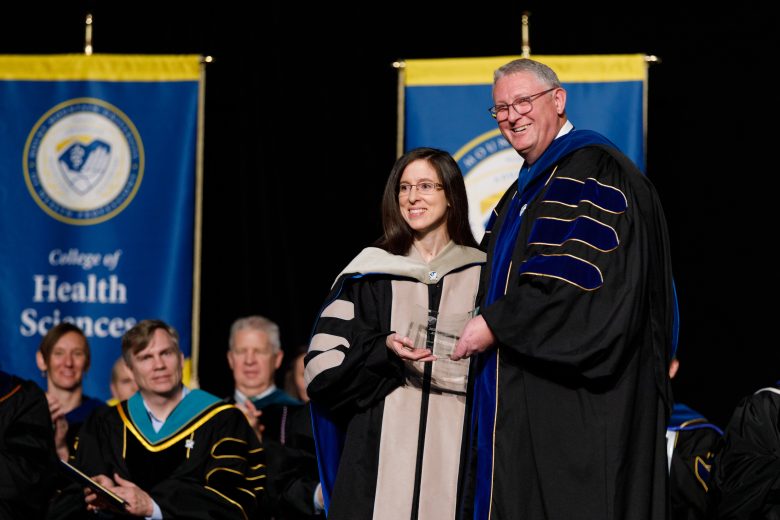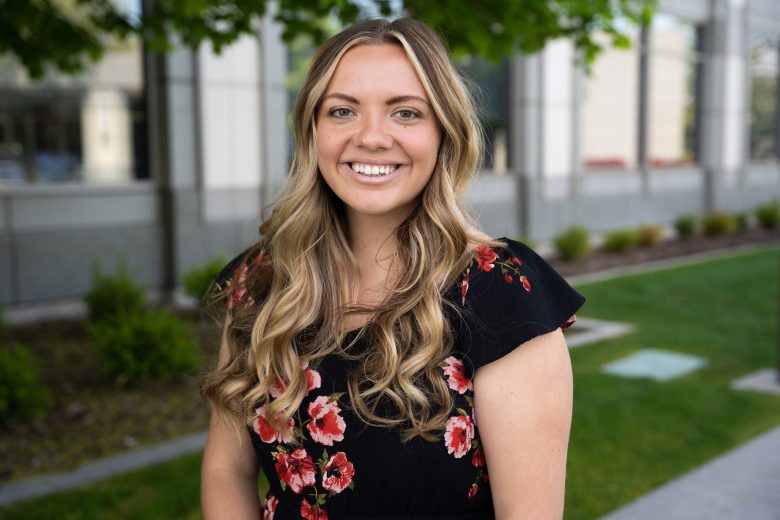Dr. Mimi Secor has been a nurse practitioner for most of her adult life – 42 years. Specializing in women’s health, she has worked in many different settings including emergency rooms, prisons, and rural Alaska. She has been an advocate for nurse practitioners, has written a few books for nurse practitioners, and is a popular speaker at nurse practitioner trade events.
Today she continues her passion to support nurse practitioners and has added to her repertoire, working with her daughter, to help healthcare professionals get healthy and fit. This opportunity presented itself when she decided to go back to school at the age of 59 to get a Doctor of Nurse Practice degree at Rocky Mountain University of Health Professions and realized she was susceptible to high levels of stress that she “didn’t always manage well.”
“I found myself in the doctoral program literally crashing and burning. My daughter was home one time and asked me what I was doing,” said Secor. “I told her I don’t even have time to talk to you, I’m studying. She pointed out that I wasn’t being a very good role model as a nurse practitioner, and I said I wasn’t because I’m a student and I’m all stressed out and needed to get back to work.”
Dr. Secor said her daughter helped her overcome her anxiety and stress, and she was able to keep working towards her doctoral degree. She even got to the point she was entering and winning bodybuilding competitions. She and her daughter now provide consulting to help healthcare professionals deal with stress while becoming healthier overall.
One of the suggestions she makes to healthcare professionals and others for a healthier life is to begin small by changing habits or creating new ones. “If you already have habits entrenched in your life, like brushing your teeth, you can attach drinking water to brushing your teeth. This is called habit stacking. It’s the easiest way to make changes in your life by adding small things that you can attach to something you’re already doing,” she said.
One habit stacking example Dr. Secor uses is in addition to setting an alarm to wake up in the morning, she sets an alarm to go to sleep at night because she tends to be a nighthawk. She uses the alarm to remind her to calm down at night and get ready to go to sleep. In order to maintain a healthy lifestyle, it is important for adults to get 7-8 hours each night.
“That’s why a lot of us are really stressed out and a lot of us aren’t able to think as clearly as we’d like to think [because we lack good sleep],” she said “But when our body refreshes itself and restores itself, our immune systems actually recharge, and our memory recharges when we’re getting good sleep. There is so much magic that goes on with sleep. You can’t lose weight if you’re not getting enough sleep because lack of sleep stalls out your metabolism.”
Dr. Secor states there are multiple strategies for students who are stressed out – especially graduate students.
“One of the most powerful strategies for students is exercising because you can pound out a lot of stress through exercise,” said Dr. Secor. “And it doesn’t have to be at the gym. You can do a seven-minute New York Times workout that will burn your butt.”
Dr. Secor said exercise can make all the difference for anyone, but especially graduate students. “Exercise is the most underutilized antidepressant, whereas food can be the most abused,” she said.
As an example, Dr. Secor said, “I [turned] 65 in August. I went back to school at 59, earned my doctoral degree at 61 and was healthier when I graduated than I was when I was in my twenties. Since that time, I’ve been in four competitive bodybuilding competitions. The last one, I came in second in the over 55 [classification].”
Dr. Secor mentions no two humans are alike – the ‘snowflake’ effect. Everyone will require different eating plans in terms of the kinds of foods, the number of foods, the timing of foods. “We believe you have to find foods you like so you can sustain a program. We don’t believe in diets, diets are just die with a t on the end,” she said.
Dr. Secor also doesn’t believe in exercise plans that people have to suffer through. “Find something you like that will sustain you. Maybe it’s dancing to wonderful music. It has to be something you like, otherwise you’re not going to keep doing it,” she said.
Regardless of what people choose for their eating and exercising, they need to eliminate their excuses. “You know, when I post something on Facebook, I’ll end it with the hashtag ‘no excuses’ because I used to be the queen of excuses. Excuses are just your mind trying not to change. It’s called homeostasis and it does not serve us well. You have about five seconds from when you make a healthy intention to execute it before your brain will start talking you out of it,” she said.
A lot of the success with change is realizing it’s all about the habit and less about the intensity. Dr. Secor said you’re better off exercising for 15 minutes, which is one percent of your day, than not exercising at all. People don’t need an hour to go to the gym. Just small changes can make you feel better and keep a new habit going. I would encourage people to think about that.
“When we give students this assignment [to exercise for 15 minutes for example], all of them said when they stepped up to the challenge that it was longer than 15 minutes, but they thought to themselves, ‘I can do 15 minutes.’ It’s not something that overwhelms their brain – their brains aren’t giving them a thousand excuses, but rather, ‘I’m going to work out for 15 minutes.’ That’s a good starting point. The whole deal is learning how to tame your mind so it cooperates with what you want to do, what you know you want to do to feel better.”
In conclusion, Dr. Secor said regarding overcoming stress and feeling healthier while working on your degrees, “Finally…it is on mind and mindset and how you need to train your brain to cooperate with you. In order to make this transformation, you have to learn how to think positively. You have to learn how to execute and you have to eventually get to the point where you really honor yourself so much, you’re willing to take that extra effort and apply it to consistent, healthy changes.”
People can read more about Dr. Secor’s recommendations in her book, Debut A New You: Transforming Your Life at any Age. Listen to the complete podcast episode here.



